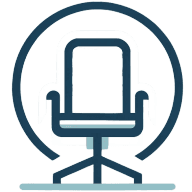7 Self-Care Practices for Executive Directors Managing High Demands
Explore essential self-care strategies tailored for executive directors overwhelmed by high demands. This article distills valuable insights from seasoned professionals to help manage stress and enhance productivity. Learn practical tips on time management, boundary setting, and decision-making to elevate daily routines.
- Schedule Protected Time for Breaks
- Set Clear Boundaries for Mindfulness
- Reduce Decision Fatigue by Outsourcing Choices
- Use Time-Blocking for Efficiency
- Schedule Unplugged Time Every Evening
- Set Non-Negotiable Boundaries for Personal Time
- Implement a Structured Daily Schedule
Schedule Protected Time for Breaks
What works for me is scheduling "protected time." This means blocking off specific times in my day, even just 15-20 minutes, and treating those appointments as non-negotiable. During this time, I completely step away from work. Sometimes it's a quick walk outside; other times, it's listening to music or just sitting quietly. It's not about being "productive" during this time; it's about recharging. It felt awkward at first, I'll admit, but consistently prioritizing these short breaks has made a significant difference in managing stress and maintaining my own well-being. It's an investment in myself, and it allows me to be more effective in all areas of my life.

Set Clear Boundaries for Mindfulness
As a former Executive Director, I can honestly say that prioritizing self-care was one of the toughest challenges I faced with so many demands on my plate. However, I quickly realized that setting clear boundaries and making time for myself was essential to maintaining my well-being. One practice I incorporated into my daily routine was setting aside time each morning for mindfulness—whether it was a quick meditation, some light stretching, or just a few moments to breathe and center myself before diving into the day's responsibilities.
This routine helped me start each day with a calm mindset, so I was mentally prepared for whatever came my way. It set a positive tone for the day, allowing me to focus more clearly and reduce stress. By making self-care non-negotiable, I found I was better equipped to handle high-stress situations, be present for my team, and make decisions with a clearer perspective.

Reduce Decision Fatigue by Outsourcing Choices
One self-care practice I've implemented as an Executive Director is reducing decision fatigue by outsourcing small, daily choices-freeing up mental energy for what truly matters.
How It Works:
* I created a "default mode" for routine decisions, such as wearing similar outfits each day, meal prepping the same lunches, or setting standing meeting times instead of rescheduling constantly.
* I delegate non-critical choices to my team-if something doesn't require my direct input, I let them handle it.
* I use automation for repetitive tasks like scheduling, reminders, and follow-ups, so I'm not constantly making micro-decisions.
Why It Works:
* Reduces mental clutter so I can focus on high-impact leadership tasks.
* Prevents burnout by eliminating unnecessary stress over minor choices.
* Creates space for personal well-being, ensuring I have energy left for self-care, strategic thinking, and personal time.
By outsourcing the small stuff, I protect my mental bandwidth-allowing me to be a more present, effective leader without running on empty.

Use Time-Blocking for Efficiency
For years I struggled with effectively managing my time, until about a year ago when I discovered the (annoyingly simple) method of time-blocking. For me, this was a game changer. It helped me become a much more efficient Director, to the extent that I then expanded the approach to improve my personal life too. Now, I structure my day with dedicated blocks for breaks, lunch, and time to switch off before and after work.
Instead of treating self-care as an afterthought, it's now built into my schedule like any other essential task. That means setting aside time in the middle of the day to actually step away, eat properly, and reset, rather than mindlessly working through lunch. At the start and end of the day, I have blocks reserved for exercise, reading, or anything that helps me decompress before switching into or out of work mode.
This approach not only helps maintain a sustainable work pace, but it also means I'm more focused and productive during working hours. When you treat personal time with the same importance as a meeting or deadline, it stops feeling like an indulgence and starts feeling like an essential part of performing at your best.

Schedule Unplugged Time Every Evening
I prioritize self-care by setting clear boundaries and incorporating mindfulness into my routine. One practice I've implemented is scheduling "unplugged" time every evening, where I disconnect from work emails and devices to focus on personal time. This helps me recharge mentally and emotionally. I also make sure to incorporate regular exercise and healthy meals into my day to maintain physical well-being. These practices allow me to stay focused, reduce stress, and maintain the energy needed to lead effectively without burning out. It's essential for long-term success in such a demanding role.

Set Non-Negotiable Boundaries for Personal Time
Prioritizing self-care while managing the demands of being an Executive Director is essential for maintaining focus and resilience. One practice I've implemented is setting non-negotiable boundaries around personal time to recharge.
For example, I dedicate the first hour of each morning to mindfulness activities such as meditation and journaling, which help me start the day with clarity and purpose. This routine creates a buffer between waking up and diving into work-related responsibilities, allowing me to approach challenges with a calm and focused mindset.
Incorporating self-care into my daily schedule has not only improved my mental well-being but also enhanced my leadership abilities. By taking time to reflect and center myself, I'm better equipped to handle high-pressure situations and make sound decisions for the organization.
This balance has also set a positive example for my team, encouraging a culture that values well-being alongside productivity. Self-care isn't a luxury—it's a necessity for sustaining energy and creativity in a demanding role. By prioritizing even small, consistent practices, I've found it's possible to maintain both personal health and professional effectiveness, ensuring long-term success in leadership.

Implement a Structured Daily Schedule
Good day,
How do you prioritize self-care while managing the demands of being an Executive Director?
As an Executive Director of VMeDx, prioritizing self-care while balancing demanding responsibilities is essential for personal well-being and effective leadership. One key strategy I use is implementing a structured daily schedule that includes dedicated time for self-care, such as exercise and mindfulness practices. I incorporate brief breaks to recharge and prevent burnout even amid a busy day.
Additionally, I recognize the importance of delegation and empowering my team. By entrusting others with key tasks and responsibilities, I can focus on strategic initiatives while maintaining a healthier work-life balance. This approach ensures I'm not overwhelmed by day-to-day operations, allowing more time for personal recovery.
Lastly, I maintain a healthy lifestyle, including balanced nutrition and quality sleep. Ensuring proper rest is vital for decision-making and overall performance. By integrating self-care habits into my routine and fostering a culture of teamwork, I am better equipped to handle the pressures of being an Executive Director while remaining focused and energized.
Share one practice you've implemented to maintain your well-being.
One practice I've implemented to maintain my well-being is daily mindfulness meditation. Taking just 15-20 minutes daily to focus on my breath and center my thoughts helps reduce stress, improve clarity, and recharge my mental energy. This practice allows me to step away from the constant demands of my role and regain focus, making me more effective in decision-making and leadership throughout the day. Additionally, it has a calming effect, enabling me to stay present and navigate challenges with a clearer mindset.


